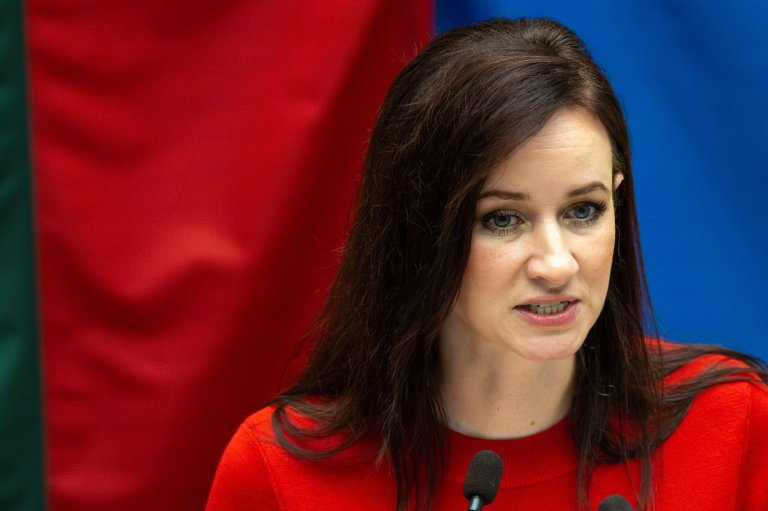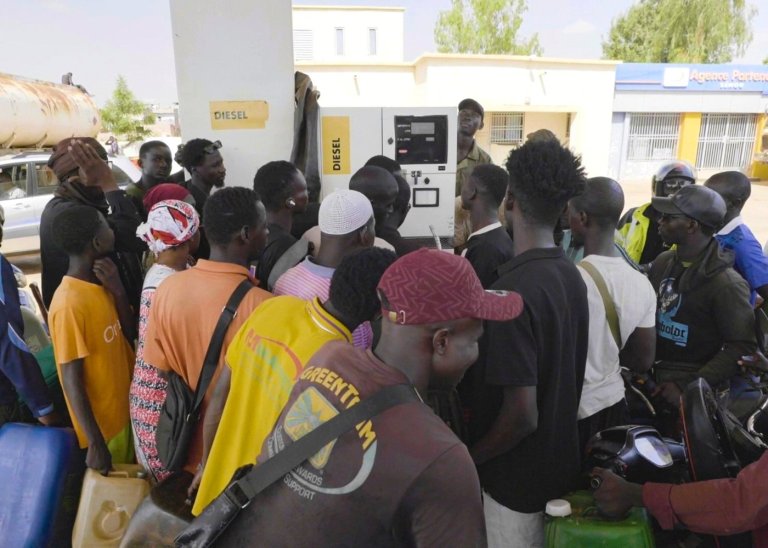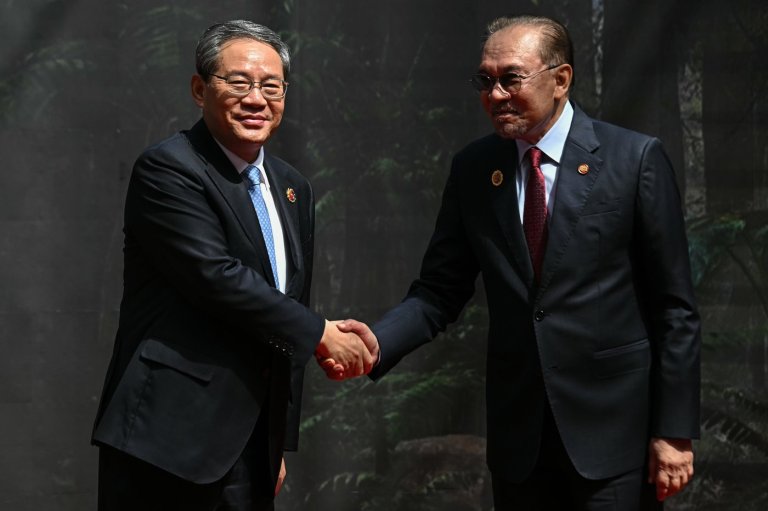Editorial Roundup: United States
Excerpts from recent editorials in the United States and abroad:
___
Sept. 2
The Washington Post say Iran is stonewalling nuclear inspectors
Iran keeps behaving like an outlaw regime. Australia expelled Tehran’s ambassador last week based on intelligence that its government masterminded an attack on a synagogue in Melbourne and a kosher food company in Sydney. The head of the United Nations nuclear watchdog is receiving enhanced security because of what he calls a threat “ from the direction ” of Iran. On Sunday, the Iran-backed Houthis raided the offices of the World Food Program, World Health Organization and UNICEF in Yemen’s capital.
Two and a half months after the United States launched airstrikes against Iran’s nuclear facilities, after which President Donald Trump brokered a ceasefire to end Israel’s 12-day war, leaders in Tehran are back to playing their old games of defiance, threats and subterfuge to conceal information about what remains of their program. Iran’s recalcitrance raises the prospect that American military forces might need to be called in again.
Since the June strikes against the facilities at Fordow, Natanz and Isfahan, the regime has mostly suspended cooperation with international nuclear inspectors. Tehran has also refused to account for the now missing stockpile of highly enriched, near-weapons-grade uranium that it possessed before the attacks. Last Wednesday, inspectors visited the Bushehr reactor, which remains live, but they have not been allowed to see what’s left of the facilities struck by B-2 bombers as part of Operation Midnight Hammer.
The most hopeful explanation is that Iran is blocking the inspectors because it fears independent confirmation that its costly 30-year nuclear program has been destroyed — but hope has never been an effective counterproliferation strategy.
This predicament comes partly because there was never a fully reliable assessment of the effectiveness of the airstrikes. Lingering questions include how much of the Iranian program was destroyed vs. severely damaged, and whether Iran’s capabilities were set back by years or only months.
Frustratingly, these questions became embroiled in partisan politics after Trump insisted that Iran’s program had been “ totally obliterated.” The head of the Defense Intelligence Agency, Lt. Gen. Jeffrey Kruse, was fired in August after his staff assessed that the strikes had set back Iran’s program only by months. This has had a chilling effect on the intelligence community.
But questions remain. There was ample evidence that Iran had removed uranium from Isfahan before the strike. But Trump posted on social media: “Nothing was taken out of facility. Would take too long, too dangerous, and very heavy and hard to move!” He was apparently referring to Fordow, but Isfahan is where the uranium was thought to be stored.
The only way to know for certain what’s left is for the inspectors to fully return and for the Iranian government to come clean about what, if anything, it still has. To prevent further conflict, Iran also needs to reenter negotiations with the United States over any future nuclear program for civilian-only use. The United States says it is ready to talk, but Iran has insisted as a precondition, among other things, that Trump commit to no further strikes. That would give away too much leverage.
Iran is indisputably violating its obligations under the 2015 international nuclear agreement. Trump withdrew from that agreement in his first term, but the deal remained in force for the other signatories. On Thursday, Britain, France and Germany triggered a 30-day countdown period to reimpose sanctions. These will go into effect unless the regime resumes full cooperation with the International Atomic Energy Agency, commits to direct talks with the United States and accounts for the missing uranium. Tehran warns of a “ harsh response ” if sanctions are imposed, threatening to go so far as withdrawing from the Nuclear Non-Proliferation Treaty.
Renewed sanctions might have relatively limited impact because Iran’s economy is already in bad shape. Its currency, the rial, trades at over 1 million to $1. At the time of the 2015 deal, it was 32,000 to $1. The United States and Europe do minimal trade with Iran. The country’s most important trading partner is China, which buys about 90 percent of Iran’s shipped oil. Beijing is unlikely to abide by any new sanctions, which would also place restraints on Iran’s exports of ballistic missiles and drones, but those are mostly sold to Russia, which would similarly ignore any new sanctions.
If Tehran takes any lesson from June, it should be that the United States is not afraid of using military force to prevent Iran from getting nuclear weapons. Trump resisted pressure from the vocal isolationist faction in his base, and he could do so again if he feels it is necessary to protect the nation’s security.
ONLINE: https://www.washingtonpost.com/opinions/2025/09/02/iran-nuclear-program-iaea-snapback/
___
Aug. 31
The New York Times says Gaza media ban indicates Israel’s leaders are trying to conceal their horrors
All wars are dangerous to cover, but Gaza holds a place of its own among modern conflicts for the peril faced by journalists. Some 200 journalists have been among the estimated 63,000 people killed since the Gaza war began — an overwhelming majority killed by the Israeli military. Those deaths have helped make the past two years the deadliest period for journalists since the Committee to Protect Journalists, a nonprofit organization, started keeping records in 1992.
The deaths are one more layer of the agonizing human tragedy in Gaza. Families and neighborhoods have been destroyed, and many brave journalists have lost their lives while attempting to help the world understand the war. Nearly all of these journalists have been Palestinian because Israel has barred outside members of the media from entering Gaza.
That ban on outside media is both outrageous and self-defeating. Israel’s leaders and defenders often argue that they are held to a different standard during wartime from other nations, and they are sometimes correct about that. But the refusal to allow international journalists to cover the war on the ground is an example of the Israeli government’s failing to follow a standard that many other governments, especially democracies, follow. The United States allowed reporters to cover the wars in Afghanistan and Iraq. Ukraine allows journalists in to cover its war with Russia.
Prime Minister Benjamin Netanyahu and his government seem to believe that keeping foreign journalists out of Gaza advances their narrative. In Israel it may help serve that purpose by giving some Israelis an excuse to dismiss coverage of Gazan suffering as Palestinian propaganda. Globally, though, the policy has spectacularly failed: Thanks to social media and the work of those brave Palestinian journalists, people can see the mass killing, severe hunger and wholesale destruction in Gaza, and it has prompted an outcry. Keeping out the international media indicates that Israel’s leaders are trying to conceal the war’s full horror. It evokes the failed attempts by American leaders to bury the truth during the Vietnam War.
The ban also seems to be contributing to the Israeli government’s callousness toward the journalists who are covering the war. Often, war-fighting governments take steps to reduce the risks to journalists covering the conflict. Yes, on-the-ground reporting remains dangerous, but military planners nonetheless take account of where journalists are operating and how they might be protected. Israel has failed in this regard. It seems likely that Israel would have tried harder if the journalists in question included more Americans and other nationalities. (The New York Times was among more than 100 news organizations to sign a letter in February 2024 calling on Israel to live up to international law and protect Palestinian journalists who continue to report, “despite grave personal risk.”)
An attack last week offered a terrible and telling example. Israel has sometimes used so-called double-tap strikes in Gaza, in which an initial strike is followed by another, with the purpose of maximizing damage to the enemy. Yet journalists and emergency medical personnel are often first to the scene. On Monday the Israeli military shelled Nasser Hospital in southern Gaza, later saying that it had targeted what it thought was a Hamas surveillance camera. Moments after the first attack, a second occurred. In all, at least 20 Palestinians were killed, including five journalists from The Associated Press, Reuters, Al Jazeera and Middle East Eye. Most of the casualties came from the second strike.
Mr. Netanyahu called it a “tragic mishap,” said that Israel values journalists and promised a military investigation. But Israel’s use of the double-tap tactic in urban warfare is a sign of its disregard for civilian life and for the people trying to ascertain the truth of the war.
To be clear: Hamas is hardly a model of open information. It has long behaved as a brutal totalitarian government in Gaza that threatens, punishes and sometimes kills people who attempt to speak the truth. Ibrahim Muhareb, a journalist who was beaten unconscious by men who said they were from Gaza’s police investigations department, told the Committee to Protect Journalists that one of them said, “The spy and the journalist are one and the same.” The Gaza of the future deserves a free press wholly different from what Hamas and Israel have permitted.
Israel has responded to criticism of the deaths of Gaza’s journalists by arguing that some of them are Hamas agents. At the very least, some media outlets are affiliated with Hamas or other extremist groups, such as Islamic Jihad. But it is unacceptable for Israel to smear the many courageous journalists doing vital work under almost impossible circumstances — including some for The Times — by suggesting that they are combatants. Israel has offered little, if any, evidence for its claims, while cynically keeping out international journalists.
Two weeks ago, 28 countries, including Britain, France and Germany, called on Israel to give immediate media access to Gaza, saying that journalists “play an essential role in putting the spotlight on the devastating reality of war.” In refusing the independent media’s demands for access, Israel has focused on concern for their safety. That notion is largely an excuse. The world’s journalists stand ready to cover the war. Over 70 international media and civil society organizations, including The Times, declared in another letter that they “fully understand the inherent risks in reporting from war zones.”
Israel’s government has often complained that the world has relied for information on the Gaza Health Ministry and other agencies controlled by Hamas. But what do Mr. Netanyahu and his officials expect to happen when they are banning outside witnesses from Gaza? If the Israeli government wants to let the world judge for itself, it should let in the media.
ONLINE: https://www.nytimes.com/2025/08/31/opinion/israel-gaza-media-journalists-ban.html
___
Aug. 31
The Wall Street Journal on Trump’s tariffs
President Trump’s tariffs are one of the broadest claims of executive power in American history, taxing imports from anywhere on his personal whim. The problem is he doesn’t have that power under the law or the Constitution, as the Court of Appeals for the Federal Circuit ruled late Friday in V.O.S. Selections v. U.S.
This is a crucial moment for the Constitution’s separation of powers. A 7-4 majority upheld a lower-court decision striking down the tariffs that Mr. Trump imposed under the 1977 International Emergency Economic Powers Act (IEEPA). In February he invoked the law to slap taxes on imports from Mexico, Canada and China, supposedly to address a fentanyl emergency. He later declared the U.S. trade deficit an emergency to justify tariffs on the rest of the world.
IEEPA gives a President authority to “regulate” the “importation” of goods to protect national security. Mr. Trump claims this lets him impose tariffs, as long as he declares a national emergency.
The judges disagree. “IEEPA does not use the words ‘tariffs’ or ‘duties,’ nor any similar terms like ‘customs,’ ‘taxes,’ or ‘imposts,’” the unsigned majority opinion says. This is unlike every other law in which Congress explicitly gives the President tariff power. Those laws have “used clear and precise terms to delegate tariff power, reciting the term ‘duties’ or one of its synonyms,” the judges say.
The Administration and the four dissenting judges claim the term “regulate” should be interpreted broadly. But tariffs are taxes, and the majority says that “the power to ‘regulate’ has long been understood to be distinct from the power to ‘tax.’” The Administration’s argument would let the Securities and Exchange Commission “tax substantial swaths of the American economy” because Congress authorized it to regulate stock trading.
More ominously for Mr. Trump, his tariffs run afoul of the Supreme Court’s major questions doctrine, which says that Presidents need clear authority from Congress for significant economic and political actions. The Court applied the doctrine in overturning President Biden’s $400 billion student-loan forgiveness. Mr. Trump’s tariffs certainly qualify as major, since they hit more than $4 trillion of imports annually and some 14% of the nation’s economy.
“Where the Government has ‘never previously claimed powers of this magnitude,’ the major questions doctrine may be implicated,” the majority says. Mr. Trump is the first President to use IEEPA to impose tariffs, which is “a ‘telling indication’ that the Government’s reading of a statute is incorrect.”
Mr. Trump’s lawyers try to dodge the major questions barrier by saying this is trumped on foreign policy by the President’s Article II powers. While judges typically defer to Presidents on foreign matters, as the majority says, “the power of the purse (including the power to tax) belongs to Congress.” Same for trade, as the Constitution makes clear.
If Mr. Trump gets away with his IEEPA tariffs, what’s to stop the next President from using the law to put tariffs on countries with high CO2 emissions? It isn’t hard to imagine a Democrat in the White House declaring a global climate “emergency” and arguing that because this counts as “foreign policy,” judges should give a pass.
Mr. Trump denounced the decision and blamed partisan judges, but judges nominated by Presidents of both parties were on opposite sides of the ruling. The court also left the tariffs in place for now and told the lower court to reconsider its universal injunction under the terms the Supreme Court recently laid out Trump v. CASA. But on a policy as consequential as these tariffs, the ruling can’t merely apply to the plaintiffs in this case alone.
Mr. Trump is bloody-minded on tariffs, and he’ll use whatever other statutes he can. He recently expanded his use of Section 232 national-security power to impose tariffs on “derivative” steel and aluminum products, including bulldozers, furniture, railcars, appliances, air-conditioning parts, butter knives, spray deodorants and strollers. Who knew that baby buggies were a threat to the homeland?
ONLINE: https://www.wsj.com/opinion/trump-isnt-a-tariff-king-252f89aa?mod=editorials_article_pos4
___
Aug. 29
The St. Louis Post-Dispatch says flattery, not the truth, leads Donald Trump
Anyone who watched the three-hour televised ego project that was Donald Trump’s Tuesday cabinet meeting got a look at how this president prefers to receive information: via sniveling personal flattery verging on outright genuflection.
“Mr. President, I invite you to see your beautiful face on a banner in front of the Department of Labor,” cooed Labor Secretary Lori Chavez-DeRemer.
“Your respect for law enforcement is so incredible,” gushed Interior Secretary Doug Burgum to the man who mass-pardoned some 1,500 Jan. 6 assailants against the U.S. Capitol, including many who assaulted cops.
“I wish … (the) Nobel committee finally gets its act together,” rhapsodized Middle East envoy Steve Witkoff, “and realizes that you are the single finest candidate since … this Noble (Peace Prize) was ever talked about.” (So there, Dalai Lama, Mother Teresa and Martin Luther King Jr.!)
So it continued, ad infinitum, ad nauseam, America’s walking id of a president eagerly eating it all up like some swaggering boy-king in need of constant adulation. As bizarre as the pathetic display looked to an American audience, it was deeply familiar to citizens of despotic regimes all over the world. “Dear Leaders” can never get enough of being told how dear they are.
What ever happened to speaking truth to power? America has seen that approach toward Trump play out recently as well. And it hasn’t gone nearly as smoothly as Tuesday’s cabinet-meeting-slash-bootlicking session.
The administration on Tuesday suspended more than 30 employees of the Federal Emergency Management Agency for signing a letter to Congress warning that budget cuts to the agency were dangerously undermining two decades’ worth of reforms spurred by FEMA’s catastrophic failures after Hurricane Katrina struck in 2005.
The letter outlines in detail the debilitation effects of FEMA’s foot-dragging approach to natural disasters under Trump and its determination to force states to take over more of the burden for those operations. “Our shared commitment to our country, our oaths of office, and our mission of helping people before, during, and after disasters compel us to warn Congress and the American people of the cascading effects of decisions made by the current administration,” wrote the employees.
The letter was endorsed by more than 182 FEMA workers, but just 36 signed their names, the rest saying they feared retaliation. They were, of course, right. At least this thin-skinned president’s suspension of those courageous enough to put their John Hancocks on the letter may yet face a legal challenge under whistleblower-protection laws.
The FEMA suspensions were preceded, last month, by a similar purge of 144 Environmental Protection Agency employees for signing a letter decrying the administration’s politicization of the EPA.
As with the FEMA employees, the suspended EPA workers have continued to receive their pay as the administration casts around for a way to give these clearly illegal suspensions some phony patina of legality to stand up in court. So on top of all the other outrageous elements to this story, there is waste of the taxpayers’ money.
But the bigger problem is two-fold: The administration is muzzling the scientific judgment of environmental and disaster experts who understand those topics far better than Trump and his Cabinet full of shameless sycophants do; and they’re violating the First Amendment rights of Americans to do it.
Perhaps the EPA and FEMA workers should take a page from the playbook of those Cabinet lackeys — and from dictators like Russia’s Vladimir Putin — and just bury Trump in personal flattery until he backs off his attacks on these urgent agencies.
Tell him how “beautiful” he is. Tell him he deserves a Nobel Peace Prize just for being so tough on crime (other than crime against America’s electoral process, of course). Tell him he has great hair and big hands and that only a stable genius like himself can save Americans from pollution and natural disasters.
Or, conversely, they could skip the flattery and try a heartfelt appeal to Trump’s sense of selfless duty to the country he leads.
Just kidding.
ONLINE: https://www.stltoday.com/opinion/editorial/article_3d839a83-fda6-4a4c-90eb-63b59f3daa2b.html
___
Aug. 31
The Boston Globe says gutting research integrity agencies won’t eliminate fraud at universities
The 15-year-old scandal involving Duke University researcher Anil Potti is about as bad as a research scandal can get: As a recent Globe Magazine investigation reported, a pioneering cancer doctor conducted clinical trials on patients, determining their treatment using algorithms based on falsified data, while university officials failed to properly investigate complaints about the research.
In a separate scandal, in 2019, Duke agreed to pay $112.5 million to settle a lawsuit brought by a whistleblower and the US Justice Department accusing a pulmonary researcher of falsifying data. The problems aren’t confined to one university. In 2023, journals retracted several papers by a Harvard behavioral scientist accused of fabricating data.
President Trump’s administration has launched a series of attacks on American higher education institutions, many of them of dubiouslegality and tainted by politics. It’s quite ironic, then, that in one area where universities really would merit scrutiny, the administration is scaling back the government’s efforts. If Trump were serious about cracking down on waste, fraud, and abuse at universities, he would be strengthening the federal oversight bodies that ensure scientific integrity in research. Instead, Trump has gutted them.
A federal role is crucial because universities can’t be solely responsible for policing themselves. As Ivan Oransky, cofounder of the Center for Scientific Integrity, told the editorial board, universities have little incentive to seek out fraud. “Until someone external actually has power and authority to deal with it, putting universities in charge of figuring out whether there’s misconduct, fraud, or real substantial risk to human beings isn’t doing the job,” Oransky said.
But under Trump, oversight agencies are being decimated. The US Department of Health and Human Services’ Office for Human Research Protections, which oversees federally funded research involving human subjects, has long been underfunded and understaffed. Trump fired its director, laid off staff, and dismantled an advisory committee to the secretary on human research protections, according to reports published by Stat and the Health Care Compliance Association.
Retraction Watch reported that top staff and investigators at the National Science Foundation’s Office of Inspector General, which oversees that foundation’s grants, were fired or left their jobs after Trump took office. Also gone are leaders and investigators at the HHS Office of Research Integrity, which investigates research falsification, fabrication, and plagiarism on behalf of multiple federal agencies.
There may be ways to improve federal oversight, like having government rely less on research institutions to conduct initial investigations. But even when federal oversight is robust, it leaves gaps. For example, there’s no mechanism to oversee nonfederally funded research that doesn’t relate to drugs or medical devices.
Ivor Pritchard, a retired senior advisor at the Office for Human Research Protections, said it simply isn’t possible for government to monitor labs’ daily work: “From a practical standpoint, scientific activity has to be self-correcting or self-monitoring, although external oversight mechanisms are also crucial.”
So while federal oversight is necessary, it is insufficient to ensure that researchers police themselves. To truly improve research integrity, universities themselves must get serious about oversight. Universities, research journals, institutional review boards, and funders all have roles to play in changing incentive structures so that getting research done correctly becomes more important than getting something published or into clinical trials quickly.
Jonathan Kimmelman, associate professor of biomedical ethics at McGill University, told the editorial board that the problem is cultural: When considering hiring, tenure, and promotions, universities prize innovative research. So do prestigious scientific journals deciding what to publish. They don’t value studies aimed at confirming or disproving existing research. “There are practices that can put the brakes on misconduct that we don’t reward well,” Kimmelman said. “The result of publishing negative studies or committing yourself to checking integrity is you get penalized.”
Luckily, there are those in the industry with power to change the culture — if they choose to. Kimmelman suggested medical and scientific journals could encourage or require researchers to preregister their research studies, publicly stating the hypothesis of an experiment before they conduct it. Both research institutions and journals could reward practices like inputting data into a public database so others can analyze it. Universities and journals need ways for whistleblowers to safely and anonymously report problems with research or published studies, including mechanisms to ensure thorough investigation.
Universities could do better at giving scientists credit, including promotions, for research that disproves prior studies. Journals could provide a more robust market for their publication. Kimmelman said funders that condition grants on starting clinical trials also contribute to an atmosphere where products move into clinical trials too quickly, without research being double-checked.
Institutional review boards — which approve and monitor research studies — could be made more rigorous. One former federal regulator told the editorial board that university-based boards today are often staffed by volunteers who don’t have time to thoroughly review and monitor every study. Giving professors time built into their schedule for board work could help address that.
There are also conflicts inherent in review boards funded by organizations they regulate. Many independent review boards today are for-profit entities owned by private equity investors. Stephen Rosenfeld, who founded a nonprofit independent review board called the North Star Review Board, said many boards are paid high prices by pharmaceutical companies, whose interest is in having the board do the minimal review necessary to ensure compliance. Rosenfeld has suggested that publicly funded nonprofit review boards are a better model to ensure boards prioritize the interests of human research subjects rather than the companies paying for the review. “You have to take out the structural conflicts,” Rosenfeld said.
In an era when science is increasingly viewed with skepticism, if universities, researchers, and regulators want to maintain the public trust, they need to ensure science is being done with rigorous methods and integrity.
ONLINE: https://www.bostonglobe.com/2025/08/31/opinion/research-misconduct-funding/
Join the Conversation!
Want to share your thoughts, add context, or connect with others in your community?
You must be logged in to post a comment.

















